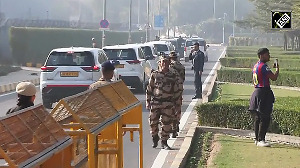Dr Henry Kissinger, former US Secretary of State and now the undisputed iconic elder statesman and expert emeritus of foreign and strategic affairs, has said the US has said all it has to say on the stalled US-India civilian nuclear deal, and now should leave India to make its on decision on it and then live with it, whatever its outcome.
Speaking at the inaugural session of the 33rd anniversary summit of the US-India Business Council, which he helped conceive, said, "I have been involved, as others here have, in encouraging India in the direction of the nuclear agreement."
"But, I believe that America has said all that it's to say on that subject. It is now an Indian problem. And India will decide," he said, and added, "it doesn't need anymore lectures on the subject."
Kissinger argued that New Delhi "understands the imperatives of each side and it will make a decision and when the decision is made, we will welcome it or live with it, and our relationship will be strong no matter what the Indian decision is."
He also advised -- obviously taking a hefty swipe at neo-conservatives who support a strong US-India strategic partnership to position India as a bulwark against a rising economically and militarily powerful China -- that "we don't need to think of Indian-American relations in terms of traditional alliances or for India to be the framework of the containment policy of the Cold War."
Kissinger noted that he has been "closely related with close relations with China, and I am also proud to be closely associated with close relations with India. We don't want to choose. We can develop both of these policies with each country and we don't have to ask India to choose."
He asserted, "It is not against American interests for India to have friendly relations with its neighbour and it is not against India's interests for us to have warm relations with China."
"What is in our interests," he said, "is that we look at the challenges before each of our societies -- how to maximise contact on every level, to exchange our insights on every level."
Kissinger declared, "We have unique advantages in the Indian-American relationship because we do have the same domestic values, we have the same language, and we have on all of the big issues of the day, really parallel goals."
"We need a global economy, whether we express that in multilateral agreement or bilateral discussions, and we cannot be indifferent to the growth of radicalism in the Islamic world and we have a common interest in every respect, even for the benefit of the Islamic world," he said.
Kissinger said New Delhi and Washington "don't want the state system in Asia to degenerate into the kind of conflict that characterised Europe and let the world go on and so we both have an interest in peaceful and creative solutions."
"So, for all these reasons, I am extremely optimistic about the future of Indian-American relations," he said, and recalled, "I've seen the opposite and I've seen how both countries had to work their way into an understanding of each other's history, culture, and geography. But, I don't know any country in the world at this moment with whom the fundamental concerns are more parallel."
Thus, Kissinger argued that "we can afford to deal with them case by case and not make our relationship dependent on any one instance, which has to be assessed by the domestic requirements of each side."
Earlier, in his remarks, he acknowledged that while there were "many ups and downs in our relationship" he had always been absolutely convinced "even at periods when there was some tension, that in the long run, when policy had to be conducted on the truly global basis, India and the United States would wind up pursuing parallel courses."
"In my view," Kissinger declared, "We have reached that point in the contemporary world," and added: "I am a great admirer of the sobriety, realism of Indian foreign policy and of Indian national policy."
He said, "India is a democracy as we are and that makes it easy for our two countries to communicate with each other. But, India is not on a missionary path to change the world in its image."





